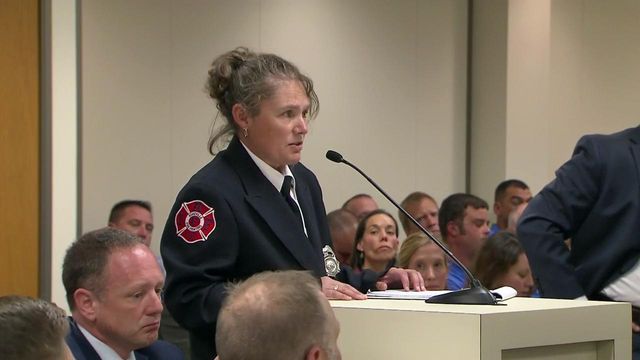Firefighter cancer bill advances in House
Legislation designating nine types of cancer as on-the-job injuries for firefighters cleared a House committee Tuesday despite opposition from a powerful lobbying group.
Posted — UpdatedStatistically, firefighters are at a higher risk than the general public for esophageal, intestinal, rectal, testicular, brain and oral cavity cancers, as well as non-Hodgkin's lymphoma, multiple myeloma and mesothelioma. House Bill 520 would change North Carolina's workers compensation law to presume that a firefighter diagnosed with one of those cancers got it on the job.
Currently, firefighters who can't prove their cancer was caused by their occupation must get their insurance to cover as much of their treatment costs as possible. Many have to keep working through chemotherapy and radiation treatments.
Sarah Collins, legislative counsel for the North Carolina League of Municipalities, argued against the change, saying adjusting workers comp for a single class of employees has been found unconstitutional by the courts in the past.
Counties and cities worry that the proposal, if passed, would increase workers comp costs for local governments that employ firefighters.
Rep. David Lewis, R-Harnett, a sponsor of the bill, noted that North Carolina already provides workers comp for police officers who suffer from post-traumatic stress disorder, and firefighters diagnosed with the nine specific cancers should be treated likewise.
"These men and women risk their lives to protect ours, oftentimes to the detriment of their own health," Lewis told members of the House Health committee. "Firefighters still are exposed through the normal course of their duties to things that can, and often do, kill them. No other professional is expected to brave that alone, to brave that without the support of their employers. That's what workers compensation is for: If you're hurt at work, if you're made sick at work, then your work helps restore your health."
Joy Ponder, a division chief with the Asheville Fire Department, told lawmakers she was diagnosed with cancer two years ago and has stayed on the job after undergoing surgery, chemotherapy and radiation. She has seen colleagues die and said the law needs to change.
"I ask you to remember the worst day that you all have had in your lives and when you've called 911 and firefighters have come out to help," Ponder said. "This is our worst day."
Rep. Donna White, R-Johnston, said cities and counties need to look at the issue not in terms of workers comp costs but an overall workforce issue. Getting young people to serve as firefighters has become increasingly difficult in many areas, White said, and sick firefighters who feel abandoned by their departments don't provide the best recruitment pitch when they're out in the community.
Rep. Carla Cunningham, D-Mecklenburg, noted that San Francisco has documented higher incidences of breast and cervical cancer among its female firefighters, and she asked whether more types of cancer could be added to the nine listed in the bill.
Sponsors said the nine were chosen because scientific studies have established a link between firefighters' duties and the illnesses. More cancers could be added in the future, they said, if science likewise links them to serving as a firefighter.
Lawmakers were unsuccessful in trying to adopt this legislation in 2015, but the science behind it has gotten stronger every year since then. Other states have passed similar laws in recent years.
House Bill 520 could be on the House floor later this week.
Related Topics
• Credits
Copyright 2024 by Capitol Broadcasting Company. All rights reserved. This material may not be published, broadcast, rewritten or redistributed.






